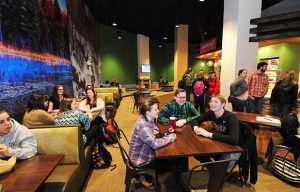
Mar 9, 2017 | News |
By Lakota Monzo, Contributing Writer

Student lounge in the new Beaver Lodge.
UMF’s new Beaver Lodge opened its doors last month following an extensive renovation of the old snack bar. Apart from some early problems with the ordering system which have since been resolved, staff and students appear to be settling into the new space, which now features comfortable, updated seating and a smoothie bar, among other upgrades.
The idea for the project which would later become the Beaver Lodge was proposed when UMF made the switch from Aramark to Sodexo for dining services.
“It was a small area that hadn’t been updated in awhile,” said Adam Vigue, General Manager of Sodexo at UMF. “Making the Beaver Lodge what it is now was a long road coming, It turned out better than what I thought,” said Vigue. He explained that the new space now has two times the equipment it previously had, a juice bar, and it features storage for all the staff to take advantage of.
“I think the school needed this update, it’s a way of showcasing the school,” said Vigue.
Audrey Gidman, a Sodexo worker at the new juice bar, is enjoying her first year working for Sodexo. “It was tricky at first with the new system, but I got into the swing of it now,” she said.
With the Beaver Lodge being accessible to the community and to students, Gidman explained that it opens them up to the public.
The first couple days the Beaver Lodge opened it’s doors, it was packed with curious students, and members of the community to see all the changes that had been made. So far, it seems that the new eatery has been well received.
“I like to spend my time here now,” said sophomore Emileigh Parsons, “it’s a comfortable environment that I can get my work done in.”
Gidman also spoke highly of the completed project. “I think Sodexo is very smart and organized,” said Gidman, “and put a lot of care into listening to students and their needs.”
With the newness of everything it is hard to see if anything needs to be changed just yet. “It’s like getting a new pair of shoes, you have to break them in before you decide if you need to change something,” said Gidman.
There were some problems with the ordering system in the first couple of days, but now the problems are worked out. “It was a learning curve for everyone,” said Parsons.
Parsons attended UMF last year with the original snack bar and said, “I’m so happy with all the changes that have been made.”
The walls are now covered with an assortment of new decorations that make it a relaxing place to get work done, which is a big change from the painted cement walls that the snack bar had last year.
“It looks super classy, and upbeat,” said Parsons.
The new Beaver Lodge is good place to go when you need a change in scenery, there is no other place like this on campus. It is located on the ground floor of the Student Center and open all day during the week.

Mar 9, 2017 | Opinion |
By Courtney Fowler, President

(Photo Courtesy of Amazon)
Okay, I’ll be honest here: I’m already deceiving you with this title. For most, writing a book review would require curling up with a great novel, probably with the smell of dusty pages filling the air around them, as they contemplate the deep life lessons and analyze the complex characters that fill the pages. Don’t get me wrong, that sounds lovely, but sadly, who has time for that anymore? So let’s start off by renaming the title to more accurately describe what I did here – “Kindle Single Review: Crazy Stupid Money.”
For those who don’t know, a Kindle Single is probably the best thing ever created – a short, quick read that serves as the perfect excuse to take a break from studying for your test. They’re even better for those of you who like to read but can hardly commit to finding the time to read a 500+ page book. I’m right there with you, don’t worry. Most of the Kindle Singles are free if you have Amazon Prime or Amazon Student, so even if you’re not loving “Crazy Stupid Money,” one of them surely will catch your attention. So, with my spiel on Kindle Single complete, let’s jump into what I am actually supposed to be doing here: reviewing a fabulous short story by Rachel Shukert.
How do you define yourself in this crazy world? Hopefully not by your appearance or the material items that have piled up in your dorm room or apartment over the years. Maybe you view and judge yourself based upon your education level or occupation, feeling most successful when you land an interview at your dream workplace or most likely, on your college graduation day.
These characteristics are certainly notable, but what about money? Are you more likable, more successful, or happier if you have more money? At the center of her book, Shukert discussed the one thing we avoid in most conversations: the importance of money not only as we struggle to survive, but in the process of navigating relationships with those around us.
In one highly applicable tale, particularly for my fellow classmates who, like me, are swimming in mounds of debt that we owe for our college education, Shukert speaks to her struggle of barely having enough money to pay her monthly rent of $3,400. Let’s all take a minute to appreciate the comparatively low rents in Farmington, but the significance still applies.
What stood out was not her struggle to earn money through her freelance writing career, but how such a lack of money made her feel: insignificant, worthless, and desperate. Though Shukert apparently had enough money to continue to order food each night for dinner (I’m a horrible cook too, so this is mildly understandable), her lack of substantial money tore apart her relationship, causing anxiety and a constant sense of frustration. Money certainly cannot buy happiness, but can it make our lives just a little more carefree?
Throughout her short story, Shukert grasps reader’s attention with her wit and humor, while managing to discuss the tricky “adult” topic of how to navigate the world with little income. It is the honesty and bravery of her work that is truly compelling, as she shares deep emotions that many of us fear to examine ourselves. Though masked with a comical storyline that will keep you laughing and engaged, Shukert addresses topics that many of us lack the confidence to face on our own.
This read will be a quick one for you (see: Kindle Single definition, above), but one that you certainly should not pass up. I can always appreciate a book that will make me literally laugh out loud, but more than this, one where I respect the author for her bold and raw emotional tales. Shukert not only exposes herself through her examination of money, power, and love, but will make you ponder the ever-persisting question – “Will I be a better, happier person when I earn more money in the future?”

Mar 9, 2017 | Feature |
By Nick Bray, Staff Reporter

The lobster tag belonging to Coneth Murray (Photo Courtesy of Caroline Farrell).
A lobster trap tag originating in Southport, Maine was recently found on a beach in Kerry, Ireland. The tag belonged to Coneth Murray, a lifelong lobsterman. Murray is the grandfather of Jess Murray, a senior at UMF.
Facebook has helped create a global lost and found, where objects which drift across the Atlantic ocean can be returned to their rightful owner with ease. The typical beachcomber might discover many artifacts from the fishing industry, and disregard them as they are so ubiquitous.
But Caroline Farrell wasn’t so quick to dismiss the common item when she came across the Mainer’s tag last month. Farrell was walking on Glenbeigh beach in Kerry with her boyfriend when they spotted the tag.
“My boyfriend does beachcombing from time to time,” Farrell said. “He has a keen eye and knows where to look for things on the beach.” Something orange caught Farrell’s eye, she picked it up and her boyfriend explained to her that it was a lobster trap tag. She immediately noticed the name Coneth Murray, printed on the tag. She was intrigued as her grandmother was a Murray and she wondered if there was any relation to this Murray.
Her boyfriend had found these tags in the past and recommended that Farrell post an image of the trap tag on the “Lost at Sea” Facebook group to find out if anyone had a connection to Coneth Murray. “Lost at Sea” is a page where people from across the world post images of things they find washed up on the beach. The group has over 6,000 members posting anything from messages in a bottle, to coins, fishing equipment, and unknown objects that users post in hopes of having the community identify the object.

A map showing the journey of the lobster tag. (Photo Courtesy of Nick Bray)
It was within hours of Farrell posting the trap tag that Jess Murray found it, and contacted Farrell. Murray’s cousin was a member of the “Lost at Sea” page and noticed Farrell’s post just hours earlier in the day. “I just clicked on her name and messaged her,” Murray said. Murray explained to Farrell that her grandfather stopped lobstering in 2001, and passed away in 2009. That means that the lobster tag was likely lost at sea for at least 16 years, if not longer.
Murray comes from a long line of lobstermen. Both her father and grandfather have been lifelong fisherman. “My grandfather lived and breathed lobstering,” Murray said. Coneth Murray was the captain and owner of the Donna Marie, the lobster boat he named after his wife. Murray’s family were very surprised to hear about this find. “My grandmother cried,” Murray said. Farrell said that she will be mailing the tag out as soon as she could and Murray will be receiving it soon.
Murray’s family is of Irish ancestry, and her parents plan on visiting Ireland this summer. They intend on visiting Glenbeigh beach where the tag was found, 2,700 miles away from Southport. The warm waters of the Gulf Stream current pass along the coast of the eastern United States, and crosses the Atlantic ocean becoming the North Atlantic current, eventually passing along the west coast of Ireland, where Glenbeigh beach is located. The tag likely become detached from Coneth Murray’s trap almost two decades ago, became lost at sea for some time, travelled with the current, resurfaced in Ireland, and is now returning to Maine after a very long journey.

Mar 9, 2017 | News |
By Angel Greer, Contributing Writer

Tyler Daigle with his fiancée, Gabrielle Severance. (Photo Courtesy of Gabrielle Severance)
Tyler Daigle, a senior history major at UMF passed away February 27th from complications related to Duchenne Muscular Dystrophy.
Duchenne Muscular Dystrophy is a genetic disorder that causes the muscles to weaken due to an absence of dystrophin, a protein that helps keep muscle cells intact. This disorder primarily affects males and progresses over time.
“Tyler was diagnosed at the age of five. He was able to walk up until he was ten. It affected every muscle in his body, including his heart,” said Tyler’s fiancée, Gabrielle Severance. Muscle weakness can begin as early as age 3, first affecting the shoulders and upper arm muscles and the muscles of the hips and thighs. By the early teens, the heart and respiratory muscles are also affected. “In the end, he was losing the use of his arms, but this didn’t stop him. He continued to go to school and complete assignments until the end,” said Severance.
“Tyler was 23 and he was a senior on his way to graduate,” said Sam O’Neal, Tyler’s CA this past year. “He was almost there. He was a smart cookie, a very smart cookie.” Tyler always knew what he wanted and did not hesitate to pursue it.
“Tyler’s favorite subject was history. He was working towards a degree in history with a minor in anthropology and political science,” said Severance.
“I loved having him in class primarily because he was so expressive,” said Nicole Kellett, Tyler’s Latin America and Anthropology professor. “I could always tell if I struck a chord with the students because Tyler would often throw his head back in laughter or shake his head back and forth in disbelief, or perhaps amazement, of what we were discussing in class,” said Kellett.
During February break, O’Neal had received a message from Susan Grace, Tyler’s mom, about him being admitted to the Hospice House in Auburn. “She didn’t really tell us much; besides that, everything was hopeful,” said O’Neal. “Everyone in Tyler’s hall and every CA in Scott itself signed a card and sent it to him while he was admitted.”
Not only was Tyler smart, but he was also kind, funny, and a great listener. “I know you kinda say this about everybody, but he was so impossibly kind to anybody…anybody and everybody that he met. Whenever he would talk you would just listen to him,” said O’Neal. “Everything he said just kinda made sense. He was very good at conversation. He loved listening to your stupid stories and he would laugh right along with you,” said O’Neal.
Tyler was strong-willed, self-sufficient, and an independent person, even while being wheelchair bound. “It didn’t matter that he was in a wheelchair because it didn’t seem like he was. He was way more independent than I’ll ever be,” said O’Neal.
“He swore that if he could walk, he’d be a wrestler,” said Severance. Tyler was a huge fan of the WWE. “He knew everyone that was in it and every move, and made up his own. He also wanted to start up a Wrestling Club,” said O’Neal. Tyler has always been actively involved here on campus and was part of a few clubs, in addition to always attending events held at the Landing.
“Tyler made UMF a better place,” said Kellett, “and I’m so grateful he chose to spend many of his formative years with us.”

Mar 9, 2017 | News |
By Sofia Vanoli, Contributing Writer

UMF students traveling to Guatemala with Safe Passage (Photo Courtesy of Blair Bailey).
A group of 12 students, seven from UMF, along with two members of the Farmington Rotary Club visited Guatemala from Feb 20-26 as part of the Safe Passage program.
Safe Passage (Camino Seguro in Spanish) is a nonprofit organization that fosters the education and good health of children from the Guatemala City Garbage Dump community.
It is not the first time the Farmington Rotary Club has arranged this trip to Guatemala City. This time they decided to extend the invitation to all members of the community to be part of the Support Team.
Doug Ibarguen, the Executive Secretary of the Farmington Rotary Club, participated in the trip and said that “The children and families of Safe Passage benefit from the Support Team visit by realizing that there are even more people who see them as being worthwhile members of the global family.”
“The main building inside the Safe Passage premises is called La Escuelita (the little school) and it is where the kids have their classes,” said Sarah Carlson, a sophomore majoring in special education, “so we helped them there and during the English classes.”
During their time in Safe Passage, the student travelers from UMF could experience firsthand the life of children who come from very poor families and attend school.
Samuel Carignan, who is a junior and an elementary education major, fondly remembered his time in Guatemala with a big smile on his face. “However,” Carignan said, “One of the things I was most taken aback by was that despite the poverty and the life they knew they would probably live, they were still so full of joy.”
“School just made their home,” Carignan said. “Students are self-motivated, which is something you don’t see in the U.S.”
The students who traveled to Guatemala all share their passion for service and global responsibility and had the desire of putting that into practice.
Hannah Somes, a senior majoring in elementary education, said that this was a positive experience because it made her think about teaching internationally.
According to Somes, this was an eye-opening opportunity. “We learned how to see a kid as a kid no matter their background,” she said, “It made me aware of my own kind of privileges.”
The trip also had a hint of adventure when students were able to hike the active volcano Pacaya, which erupted two days before they left Guatemala. Blair Bailey, a junior majoring in elementary education, described this adventure as unique and something she would not have done in the U.S.
Many of the student volunteers returned from the trip eager to do more and spread the word about their experience. They have developed a desire to drive change and promote accessible education to children in third world countries like Guatemala.
“We’ve learned from those kids that we have more than we need, so we had the idea of having a yard sale to collect money for Safe Passage,” said Somes.
Carignan felt that he learned from this trip more than what he had expected. “You don’t have to do big things to make big changes,” he concluded.





